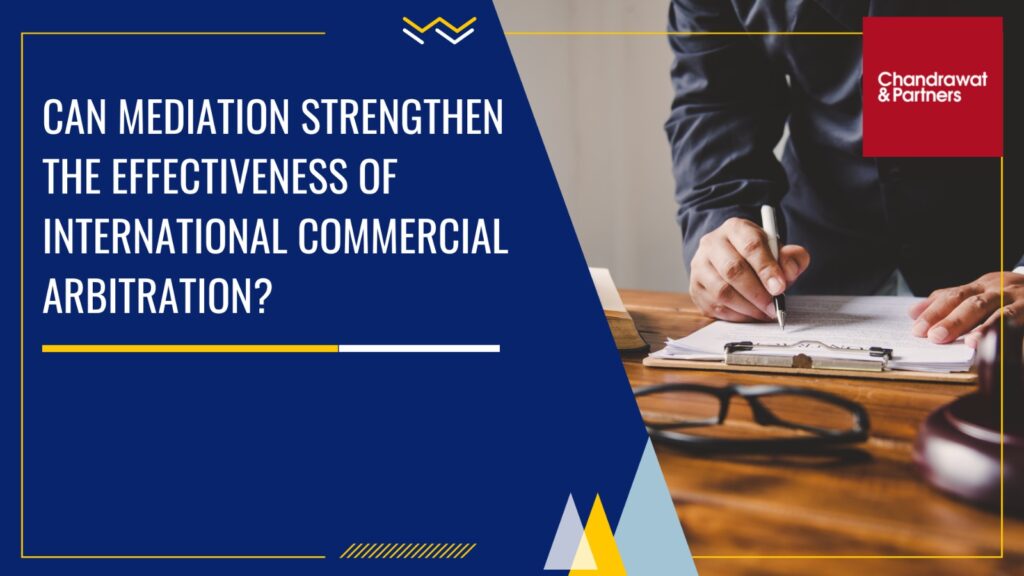Introduction
For parties seeking to settle cross-border commercial disputes, international commercial arbitration has proven to be an effective dispute resolution mechanism. However, the framework is not without criticism, with some calling for changes to address issues such as speed or lack thereof, rising costs, and the increasingly litigious nature of the proceedings. Most individuals are aware that litigation is the process of settling a disputed matter in a court of law. If a civil lawsuit cannot be resolved through alternative dispute resolution, (“ADR”) it is usually the last recourse. As a result, alternative dispute resolution (ADR) methods such as mediation or arbitration are becoming more popular.
To accomplish this, mediation must be incorporated into the arbitration process. Consequently, a hybrid method could provide more opportunities for parties to settle their disputes earlier than would generally be available in arbitration. A hybrid method, however, is not without flaws. When adjudicative and consensus-based processes are combined, ethical concerns about the neutrality of the arbitrator/mediator can arise, undermining the award’s enforceability. Hybrid methods are not new, but it examines them from the perspective of increasing the effectiveness of international commercial arbitration.
Basic understanding of arbitration & mediation
International commercial arbitration aids in the resolution of disputes between international parties arising from internal commercial agreements. International commercial arbitration is defined in Section 2(1)(f) of the Arbitration and Conciliation Act 1996 as disputes arising out of a legal relationship in which one of the parties is a citizen, resident, or habitually residing outside of India. International commercial arbitration is used by traders from various countries to settle business disputes. The application process for international commercial arbitration is the same as it is for domestic arbitration.
A neutral intermediary, the mediator, assists the parties in reaching a mutually satisfactory resolution of their dispute in a mediation procedure. Mediation is an efficient and cost-effective method of achieving that result while preserving, and sometimes even enhancing, the parties’ relationship. Some of the key features of mediation include that it is a non-binding procedure controlled by the parties, as well as that it is defined as a confidential procedure entered voluntarily by the parties.
Mixing mediation with international commercial arbitration
While the United Nations Commission on International Trade Law (“UNCITRAL”) Model Law on Conciliation states that mediated settlement agreements (MSAs) are binding, it does not specify how they can be enforced. Due to the lack of international enforcement procedures, parties have found creative ways to enforce cross-border MSAs by looking outside of mediation. The primary approach has been to seek international commercial arbitration and record MSAs as consent awards to fall within the scope of the New York Convention’s enforcement provisions.
As a result, a hybrid method of international commercial mediation has been developed to preserve many of the benefits of mediation while correcting the shortcomings in cross-border enforcement. This hybrid method has given rise to several variants, including arbitration followed by mediation (arb-med), mediation followed by arbitration (med-arb), and arbitration followed by mediation followed by arbitration (arb-med-arb). While the hybrid method has been used to improve the chances of enforcing MSAs, the provisions in international commercial arbitration that allow for consent awards were originally intended to encourage parties to an arbitration to settle before a final award was made.
Arbitration-mediation-arbitration: the method that can strengthen international commercial arbitration
Arb-med-arb offers a comprehensive solution to the parties involved, as it requires both parties to agree to the outcome of the arbitration phase before the agreement is finalized. This means both parties must be satisfied with the outcome of the arbitration before the mediation phase can proceed, minimizing the risk of a dispute arising again.
If an arb-med-arb technique can include the best aspects of mediation in international commercial arbitration while maintaining the integrity of the arbitration system, it should be adopted. By allowing parties to resolve their dispute early in the arbitration process, adopting arb-med-arb might help address some of the critiques that state that international commercial arbitration has become too sluggish, too expensive, and too similar to litigation. The Singapore International Arbitration Centre (“SIAC”) – Singapore International Mediation Centre(“SIMC”) Protocol on arb-med-arb exemplifies how to design a framework that minimizes the ethical and procedural challenges of integrating mediation and arbitration. A hybrid approach could help to strengthen the overall effectiveness of international commercial arbitration by improving the chances of enforcing MSAs. In addition, it could help to enhance the opportunities mediation may provide for settling disputes early.
For more information or queries, please email us at
enquiries@chandrawatpartners.com




